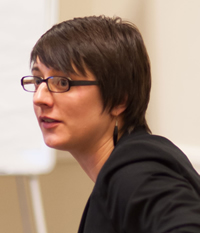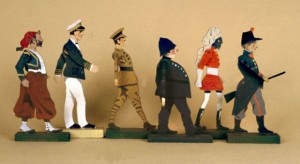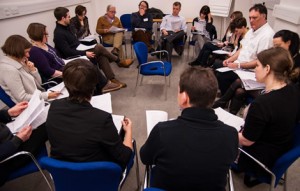Dr Catriona Pennell, Senior Lecturer in History, University of Exeter
(with Dr Ann-Marie Einhaus, Lecturer in Modern and Contemporary Literature, Northumbria University)
The passing of time as societies move further away from a moment of historical significance is traditionally marked by an anniversary. The nature of the remembrance ritual varies massively depending on the event being commemorated (and where), at what level (official or otherwise) the remembrance takes place, and the contemporary purpose (political, educational, ideological) such rituals serve. Commemoration is complex; as the eminent historian of war and memory, Professor Jay Winter says, ‘there is an overwhelming difficulty about trying to establish what is the purpose of commemoration’ exacerbated by the fact that remembering one memory often involves the ‘forgetting’ of others. Furthermore, as time evolves so does the meaning of each commemoration.
In 2014, it feels like we are surrounded by anniversaries. Already, at the time of writing, the calendar has marked the 25th anniversaries of the Soviet withdrawal from Afghanistan (February) and the massacre at Tiananmen Square (June), Shakespeare’s 450th birthday (April), as well as the 70th anniversary of the D-Day landings that marked the beginning of the invasion of Europe during the Second World War. However, 2014 is perhaps most significant for marking the beginning of the 100th anniversaries of the First World War. The centenary is not a single date; it will encompass a series of moments of ‘remembering’ over the course of four and a half years. It has been described as a ‘commemoration cycle’ – and one that is more Tour de France than sprint around a velodrome.

Image from Wolverhampton Art Gallery. The gallery holds a range of objects that relate to the First World War.
Although it is two months until the centenary that marks the beginning of the war, for Great Britain at least, there has already been a barrage of media coverage and political discussion on the subject. One wonders if there is room for any other anniversaries between 2014 and 2018; the 200th anniversary of Waterloo (2015) is unlikely to gain much attention when competing with the 100th anniversary of the Gallipoli landings. The BBC is cramming in its programming as if the centenary is nearly over. It has already broadcast dramas (37 Days andThe Crimson Field)anddocumentaries (Britain’s Great War and 1914-1918: The Cultural Front) on television and radio, amongst many other programmes. Its flagship project, in collaboration with the Imperial War Museum (IWM), World War One At Home is already over halfway through its schedule, finishing in November 2014. Prime Minister David Cameron outlined the government’s intentions for the centenary in October 2012 with his speech at the IWM, London, which announced his personal commitment to the centenary as well as £50 million of funding. Michael Gove, the Secretary of State for Education, made headlines only two days into 2014 when comments he made criticising the resilience of purportedly unpatriotic, ‘left-wing’ views of the First World War quickly developed into a heated debate on how the subject was taught.
It is precisely within this latter debate that the AHRC-funded project, ‘The First World War in the Classroom: Teaching and the Construction of Cultural Memory’ is situated. The belief that ‘Blackadder’ is the main teaching tool in history classes on the First World War is not Gove’s invention. Over the past three decades, historians have repeatedly deplored the way in which First World War teaching at secondary level contributes to the formation of a very narrow memory of the war. As well as teachers of history, teachers of English literature are criticised for their role in upholding a view of the war that centres upon ‘mud’, ‘blood’ and the Western Front.


Pingback: Why Commemorating the Past Is Important